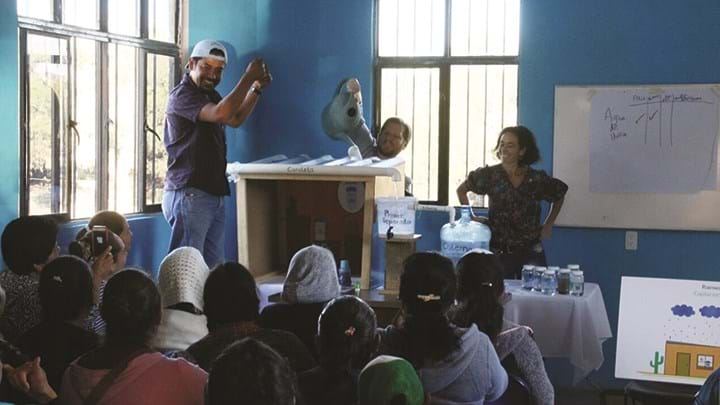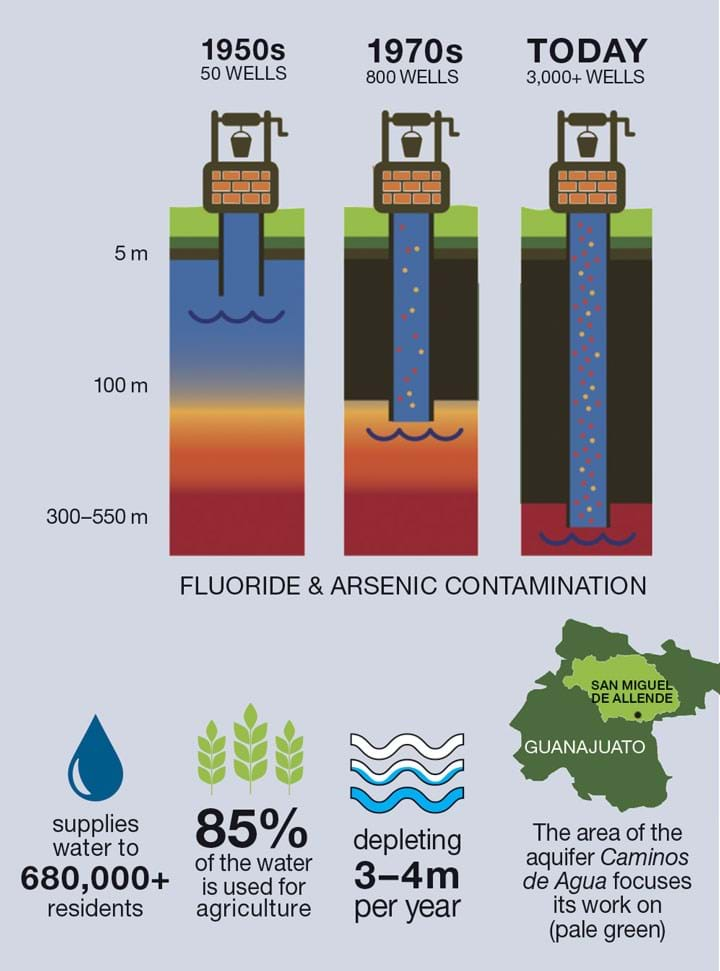Pure and Simple

Miguel Johansson Finguerut describes his work on community water projects in central Mexico
THE breathtakingly beautiful town of San Miguel de Allende, where NGO Caminos de Agua has its office, boggles many visitors’ minds with its colonial architecture and rich history. Above ground, it is a perfectly charming touristic hotspot with a growing number of luxury hotels, bars and restaurants, but below the surface there is a slow unseen disaster taking place.
The town lies near two aquifers (subterranean water systems) called Alto Rio Laja and Laguna Seca, and these are slowly being pumped dry. The subterranean water systems surrounding the city have been continually mismanaged for decades. Rapid industrial development, mining and
especially a strong growth in agriculture for export in the region has led to an over-extraction of subterranean water sources. Water from these aquifers is being extracted at an unsustainable rate, meaning that the sum of water removed from the subsurface exceeds the sum of water which can be naturally replenished throughout the year. Both Caminos de Agua and the Guanajuato state government have measured concerning water-level depletion rates as high as 3–4 m/y in regional wells. Figure 1 illustrates some key pieces of information about the regional water crisis. The people most severely affected by the lack of water are rural or marginalised communities throughout the watershed. It is costly to drill deep wells, meaning that thousands are running out of water from one year to the next. Along with an ever-increasing number of community wells drying up, many of the remaining water sources are contaminated or unsafe for long-term consumption. For many affected communities, the costs of accessing safe water for drinking and cooking has become prohibitive and currently, 99% of Guanajuato State’s population relies on well water for their daily cooking, cleaning and drinking use.

Caminos de Agua
Caminos de Agua is an organisation that works with local communities and grassroots organisations in the State of Guanajuato to develop democratic and appropriate solutions so that communities can gain affordable and sustainable access to safe drinking water. Primarily, Caminos de Agua aims to tackle this problem at a local level by supporting communities in their region through education programmes, technology development, resource donations and project planning support. Caminos has found that much of its expertise and technology development is transferrable to water challenges around Mexico and around the world. So that anyone can benefit from Caminos’ work, it publishes its work and findings in an open-source format. Caminos de Agua’s solutions and products have achieved international recognition, winning the American Society of Mechanical Engineers’ “IShow” hardware showcase in 2019 as well as being a runner up in the Mexican edition of the James Dyson Award in 2018.
Engineers Without Borders UK
Engineers Without Borders UK, is a UK-based organisation, working to provide people living around the world equal access to the benefits of engineering. They also work to influence the engineering profession and future generations of engineers to be more globally aware and inclusive in their work. For many years Engineers Without Borders UK has coordinated international placements and collaborations with UK engineers working on infrastructure and technology projects abroad.
Recent Editions
Catch up on the latest news, views and jobs from The Chemical Engineer. Below are the four latest issues. View a wider selection of the archive from within the Magazine section of this site.




